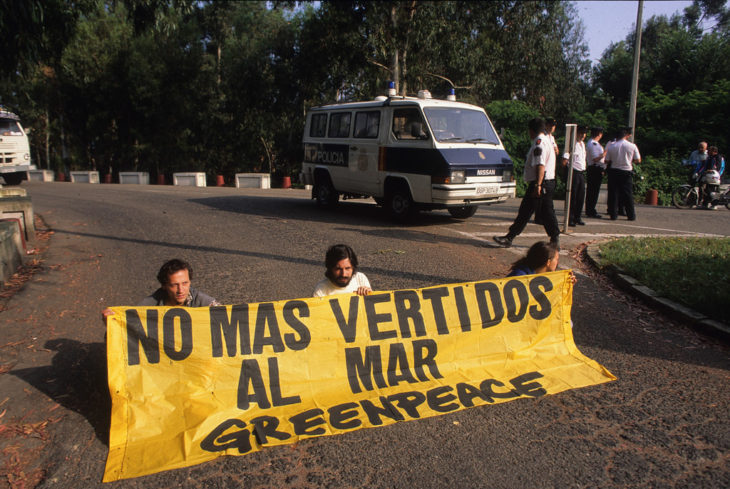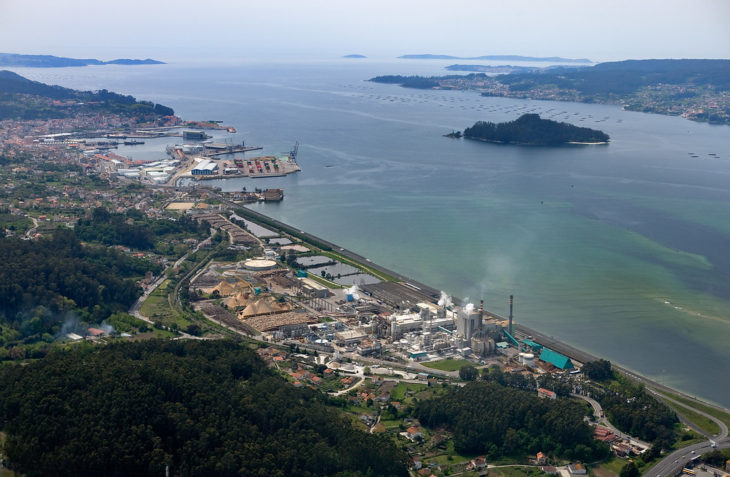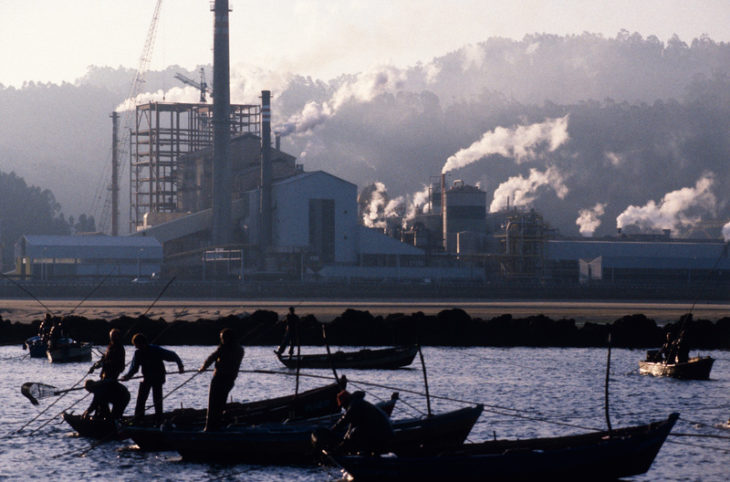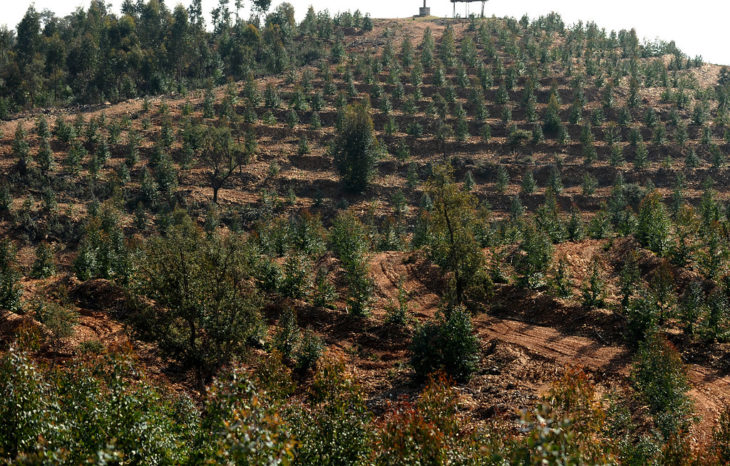
23/06/1993. Pontevedra, Galicia, España. Protesta contra la papelera Ence por sus vertidos contaminantes al mar.
Version in english below the spanish text.
Llegó la hora de que Ence nos devuelva el paraíso
El pasado 15 de julio la Audiencia Nacional dictaba sentencia a favor de Greenpeace y abría la puerta para que la planta de celulosa de Ence salga por fin de la ría de Pontevedra. Una fabulosa noticia para el medio ambiente y para todas aquellas personas que concordamos en que los intereses políticos y económicos nunca deben pasar por encima del bien común y, menos aún, sobre esos reductos de biodiversidad de los que depende el futuro del planeta.
La sentencia, contundente y coherente, da la razón a Greenpeace –y otra similar al Concello de Pontevedra– y anula a todos los efectos la indignante prórroga de 60 años, nada más y nada menos que hasta 2073, que el gobierno ¡en funciones! de Mariano Rajoy concedió en 2016 a Ence para permanecer en la costa de Lourizán. El texto concluye que la actividad de la pastera es incompatible con su presencia en el dominio público marítimo-terrestre, pues por su naturaleza puede desarrollarse en otro lugar. De hecho, así ocurre con el resto de pasteras del Estado.

15/04/2008. Lourizan, Pontevedra, Galicia, España. Imagen aérea del complejo químico donde se asientan Ence y Elnosa en Pontevedra. ©Greenpeace/ Pedro Armestre.
Una historia de amiguismo y puertas giratorias
Nos acercamos así un poco más, pues Ence aún puede recurrir al Tribunal Supremo, al final de un vergonzoso capítulo de nuestra historia. El que habla de cómo una negligente e interesada gestión pública despreció nuestros recursos naturales y nuestra biodiversidad, reprimió las protestas de miles de personas y acabó sepultando y contaminando una de las marismas más maravillosas de nuestro litoral hace 60 años.
Conviene recordar que la celulosa debía abandonar la ría en 2018, cuando venció la concesión otorgada por el desarrollismo franquista en 1958 a la entonces Empresa Nacional de Celulosas, fecha que sin duda tuvo mucho peso en el precio que Ence pago a la SEPI para culminar el proceso de privatización de la pastera en 2001. Sin embargo, Ence nunca estuvo dispuesta a respetar la ley y reubicar su actividad a partir de 2018. Logró operar en el lado oscuro del sistema incluso haciendo cambiar de criterio al Partido Popular de Núñez Feijoó, que en 2009 y 2012 llevaba el traslado de la celulosa en sus programas electorales. Y después trató de beneficiarse de esa desorbitada prórroga que se apoyaba en la indecente reforma de la ley de Costas a la carta impulsada en 2013 por el entonces Ministro de Medio Ambiente Arias Cañete. En Greenpeace publicamos aquel año una investigación sobre los intereses privados que había detrás de la reforma bajo el título Amnistía a la destrucción. Con Arias Cañete, quien tenía un amigo tenía un tesoro.

Labores de marisqueo frente a la planta de Ence en una imagen de archivo.
Ence da la espalda al empleo
En todo este tiempo Ence se ha preocupado más por mantener su millonario negocio que por los empleos –menos de los que generaría una ría restaurada y bien conservada– o por el medio ambiente, por mucho que se autodenomine con el eufemismo biofábrica. De lo contrario tendría ya bajo el brazo el proyecto de una nueva fábrica en una nueva ubicación. Pero decidió apostarlo todo a una carta, emprendiendo una estrategia basada en comprar voluntades, forzar el cambio de leyes como la de Costas y la de Cambio Climático, cerrar los ojos cuando cargos electos y activistas eran acosados o jugar a las puertas giratorias con ex-cargos públicos, entre ellos una ex-ministra y un ex-conselleiro de medio ambiente.

09/02/2011. Berrocal, Huelva, Andalucia, España. Ence renueva plantaciones de eucaliptos. Trabajos de la Empresa Nacional de Celulosas (Ence) en la zona de Berrocal, provincia de Huelva. ©Greenpeace/Pedro Armestre
Ence, una de las culpables de la ‘eucaliptización’ de España
Y mientras condicionaba la nefasta política forestal gallega, excesivamente permisiva con una eucaliptización que ha puesto en franco peligro la integridad ecológica de todo el país. Y contaminaba. Porque la producción de celulosa no es inocua para el medio ambiente. Ence contamina y ha contaminado aún mucho más, en aquellos años en los que activistas de Greenpeace bloqueaban los vertidos que envenenaban Galicia.
Mariscadoras contra el franquismo
En 2016, cuando M. Rajoy decidió darle a Ence la prórroga, el cineasta gallego Lukas Santiago, con la ayuda de la casi heróica Asociación pola Defensa da Ría (APDR), retomó un proyecto al que llamó “Paraíso Roubado”. El documental, con voz en off de Manuel Rivas, es un maravilloso ejercicio de memoria histórica que relata cómo era Lourizán antes de la llegada de la celulosa. Residencia estival del ministro y presidente Eugenio Montero Ríos, fue el centro veraniego de la política española y gallega a principios del siglo XX, un paraíso donde el turismo de élite se mezclaba con jóvenes que llegaban en el desaparecido tranvía desde Marín y Pontevedra para disfrutar de su Casa de Baños y sobre todo de su inmenso arenal. En él miles de mariscadoras, esas mujeres que llevan dentro el alma de la costa gallega y que se enfrentaron a la represión franquista para defender su playa, recolectaban almejas, berberechos y otros frutos del mar en uno de los mejores bancos marisqueros que existió en la península. En palabras del director: “la instalación de la celulosa supuso una condena para la parroquia de Lourizán, que ahora (con la prórroga) pretenden convertir en cadena perpetua”.
En Greenpeace confiamos que este gran paso se acabe confirmando en sentencia firme y en Lourizán se emprendan las medidas para “asegurar su integridad y debida conservación, adoptando, en su caso, las medidas de protección y restauración necesarias”, que es lo que dice literalmente la ley de Costas. Porque para eso se ha creado, para respetarla, para cumplirla, para proteger el medio ambiente y, en el caso que nos ocupa, para que por fin nos devuelvan el paraíso robado.
English Translation below:
The time has come for Ence to give us back paradise
On July 15, the National Court issued a ruling in favor of Greenpeace and opened the door for Ence's pulp mill to finally leave the Pontevedra estuary. Fabulous news for the environment and for all those of us who agree that political and economic interests should never go over the common good and, even less, over those pockets of biodiversity on which the future of the planet depends.
The sentence, forceful and coherent, agrees with Greenpeace - and another similar to the Council of Pontevedra - and annuls for all purposes the outrageous extension of 60 years, nothing more and nothing less than until 2073, that the government is in office! de Mariano Rajoy granted in 2016 to Ence to remain on the coast of Lourizán. The text concludes that the activity of the pastry plant is incompatible with its presence in the maritime-terrestrial public domain, since by its nature it can take place elsewhere. In fact, this is the case with the rest of the state's pastors.
A history of cronyism and revolving doors
We get a little closer this way, as Ence can still appeal to the Supreme Court, at the end of a shameful chapter in our history. The one who talks about how a negligent and interested public administration despised our natural resources and our biodiversity, repressed the protests of thousands of people and ended up burying and polluting one of the most wonderful marshes on our coast 60 years ago.
It should be remembered that cellulose had to leave the estuary in 2018, when the concession granted by Franco's developmentalism in 1958 to the then National Cellulose Company expired, a date that undoubtedly had a lot of weight in the price that Ence paid to SEPI to complete the process of privatisation of the pastry plant in 2001. However, Ence was never willing to respect the law and relocate its activity as of 2018. It managed to operate on the dark side of the system even by changing its criteria to the Popular Party of Núñez Feijoó, which in 2009 and 2012 it carried out the transfer of cellulose in its electoral programs. And then he tried to benefit from that exorbitant extension that was supported by the indecent reform of the law on Coasts a la carte promoted in 2013 by the then Minister of the Environment Arias Cañete. In Greenpeace we published that year an investigation into the private interests behind the reform under the title Amnesty for destruction. With Arias Cañete, whoever had a friend had a treasure.
In all this time Ence has been more concerned with maintaining its millionaire business than with jobs - less than those generated by a restored and well-preserved estuary - or with the environment, no matter how much it calls itself the biofactory euphemism. Otherwise he would already have under his arm the project of a new factory in a new location. But he decided to bet everything on one card, embarking on a strategy based on buying wills, forcing the change of laws such as Costas and Climate Change, closing his eyes when elected officials and activists were harassed, or playing revolving doors with ex- public officials, including a former minister and a former environment minister.
Ence, one of the culprits of the ‘eucalyptization’ of Spain
And while conditioning the disastrous Galician forest policy, excessively permissive with eucalyptization that has put the ecological integrity of the entire country at risk. And it polluted. Because pulp production is not environmentally friendly. Ence pollutes and has polluted even more, in those years when Greenpeace activists blocked the spills that poisoned Galicia.
Blocking the main entrances to the Ence plant
In 2016, when M. Rajoy decided to give Ence an extension, the Galician filmmaker Lukas Santiago, with the help of the almost heroic Asociación pola Defensa da Ría (APDR), took up a project that he called “Paraíso Roubado”. The documentary, with a voiceover by Manuel Rivas, is a wonderful exercise in historical memory that recounts what Lourizán was like before the arrival of cellulose. Summer residence of the minister and president Eugenio Montero Ríos, it was the summer centre of Spanish and Galician politics at the beginning of the 20th century, a paradise where tourism or the elite mixed with young people who arrived in the disappeared tram from Marín and Pontevedra to enjoy its Bath House and especially its immense sandy area. In it, thousands of shellfish women, those women who carry within the soul of the Galician coast and who faced Franco's repression to defend their beach, collected clams, cockles and other fruits of the sea in one of the best shellfish banks that existed in the peninsula. In the words of the director: "the installation of the cellulose was a sentence for the parish of Lourizán, which now (with the extension) they intend to convert into life imprisonment".
In Greenpeace we trust that this great step will end up being confirmed in a final judgment and in Lourizán measures will be taken to "ensure its integrity and due conservation, adopting, where appropriate, the necessary protection and restoration measures", which is what it literally says the Coastal law. Because that is why it has been created, to respect it, to comply with it, to protect the environment and, in the case at hand, to finally return the stolen paradise to us.
What great news and well done to Greenpeace, a lot of time and patience and persistence to achieve this outcome. A big win for the environment. The bottom line each time is money, it is behind a lot of the bad things that are happening today, but with wins like these, it gives the rest of us a boost to carry on in what seems at times a hopeless cause.
The blog song for today is: " All right now" by Free
TTFN



No comments:
Post a Comment